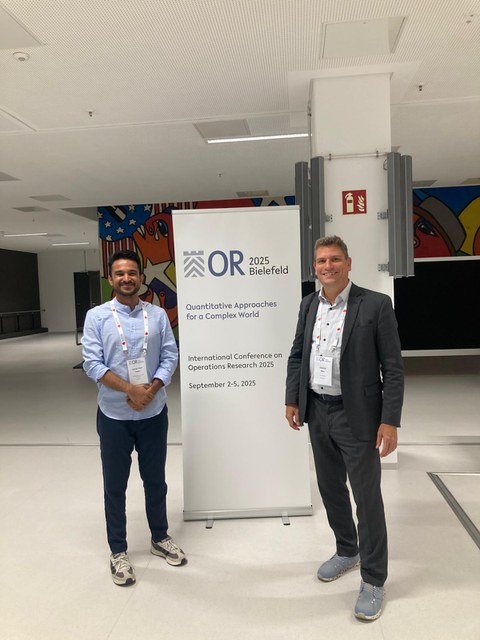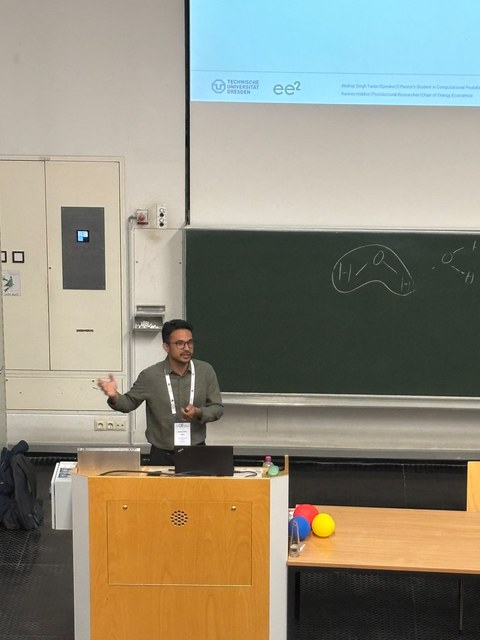29.09.2025
enerCONNECT Travel Grant in Action: Akshay Singh Yadav at the OR 2025
I had the chance to attend the International Conference on Operations Research 2025 (OR 2025), organized by GOR at the University of Bielefeld from September 2nd to 5th. I presented work from my third-semester research project (WS 2024/25) in the Stream Energy and Sustainability, within the invited session Uncertainty and Energy. My abstract was accepted for presentation, and thanks to the support of enerCONNECT and the Chair of Energy Economics at TU Dresden, I was able to take part.
The topic of my talk was “Rethinking N-1 Security: Balancing Reliability and Economy in Electricity Transmission.” This research, supervised by Dr. Hannes Hobbie, looks at how Germany’s power grid is under growing strain from renewable integration, with congestion management volumes and costs steadily rising. The N-1 security criterion, while ensuring reliability, exacerbates costs by reserving capacity for rare contingencies— especially when dealing with the inherent variability of renewable energy sources. The study proposes a risk-aware approach: a chance-constrained framework that relaxes N-1 selectively during critical hours and on lines with the highest congestion costs. Building on the ELMOD framework for electricity market simulations, we extended it with a mixed-integer program to optimize N-1 relaxation while keeping reliability at defined levels. The results showed promising cost reductions of up to 26–30% under daily and annual relaxation strategies. To my knowledge, this is one of the first risk-based implementations of N-1 relaxation in transmission planning.
Presenting this work and discussing it with an audience of researchers from both operations research and energy economics was incredibly valuable. It gave me the chance to view my project from a broader perspective, understand its technical and economic relevance, and identify gaps and improvements to work on before taking it further. Beyond the research itself, preparing and delivering the talk strengthened my academic communication skills—especially learning how to summarize complex findings for a diverse audience and organize a clear narrative.
Besides my own presentation, I attended several sessions and plenary talks, especially those focused on energy economics and electricity market design. A plenary session on optimization in offshore wind farms was particularly relevant for my thesis, as it touched on investment planning, lot sizing, and geometric layout of offshore plants. Other sessions on bilevel programming, game theory, and mixed-integer approaches were also insightful and directly connected to my research interests.
The cherry on top for me was definitely the personal interactions. Talking one-on-one with professors, entrepreneurs, and fellow researchers from around the world gave me a sense of how others approach their work, the challenges they face, and the different ways OR methods can be applied. These conversations opened my eyes to the breadth of the field and gave me inspiration that I will carry forward in my early career as a researcher.
For students currently in their bachelor’s or master’s programs, I would strongly recommend attending such conferences. They not only show the bigger picture of how our work fits into society, but also sharpen our sense of direction—whether for a seminar paper, a thesis, or future research. Understanding what the research community expects and values helps us ask better questions. The networking opportunities—meeting like-minded people working on similar challenges from different angles—were an added bonus. I would especially encourage TU Dresden students in energy-related fields, or those conducting research in this area, to join volunteer organizations like EnerConnect. They serve as a valuable window into the wider world of energy research at a time when tackling climate change is a global priority.
Finally, I would like to sincerely thank enerCONNECT for supporting my participation so quickly and generously. This kind of opportunity makes a real difference for young researchers. As I continue in the field of energy economics, I look forward to applying what I learned at OR 2025 and contributing further to the goals EnerConnect stands for.
Akshay Singh Yadav


